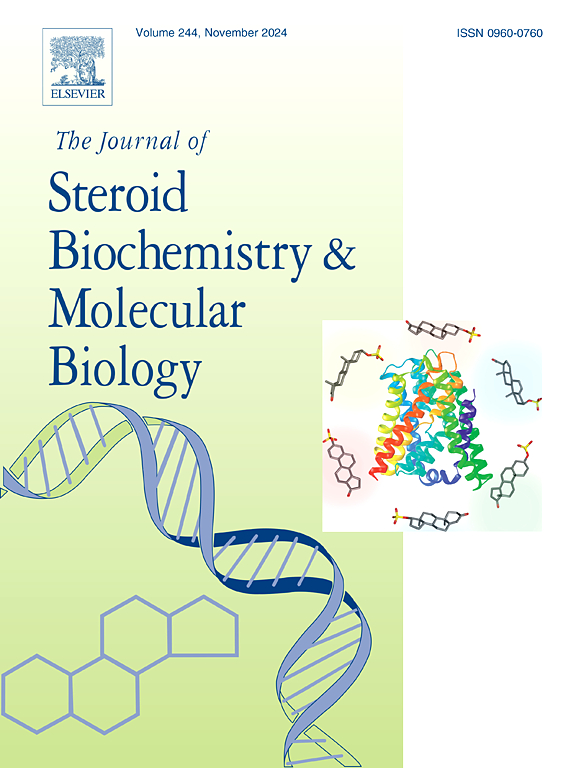长期摄入薯蓣可抑制2型糖尿病大鼠睾丸萎缩,增强其抗炎症能力
IF 2.7
2区 生物学
Q3 BIOCHEMISTRY & MOLECULAR BIOLOGY
Journal of Steroid Biochemistry and Molecular Biology
Pub Date : 2025-03-15
DOI:10.1016/j.jsbmb.2025.106730
引用次数: 0
摘要
黄薯蓣增加肥胖和2型糖尿病患者的性类固醇激素,从而损害类固醇生成。然而,长期摄入牛蒡子对睾丸性类固醇激素浓度和睾丸功能的影响,特别是对氧化应激和炎症的保护作用尚不清楚。该研究评估了慢性豆科糖摄入和运动训练对2型糖尿病大鼠睾丸功能的影响。选取20周龄大冢龙-埃文德岛脂肪大鼠,随机分为对照组、运动训练组(以25 m/min的速度跑步1 h,每周5天)和豆科动物摄食组(以正常饲料喂养时为0.3% %)(每组 = 8只)。以Long-Evans德岛大鼠为健康对照(n = 7)。8周的豆科植物摄入或运动训练显著增加血浆中脱氢表雄酮(DHEA)、游离睾酮和5α-二氢睾酮(DHT)的浓度。睾丸中的脱氢表雄酮、睾酮和二氢睾酮浓度未见显著升高。雄激素受体(AR)的表达显著增加与运动训练有关。参与精子修饰的组织蛋白酶L的表达没有显著变化,而保护精子免受氧化应激的谷胱甘肽过氧化物酶4 (GPx4)的表达在肉苁茸组显著增加。此外,代谢清除率(MCR)是胰岛素抵抗的指标,与睾丸重量和GPx4表达显著相关。这些结果表明,通过摄入牛蒡子改善2型糖尿病大鼠的MCR,可以抑制睾丸萎缩,增强对氧化应激和炎症的保护能力。本文章由计算机程序翻译,如有差异,请以英文原文为准。
Chronic intake of Dioscorea esculenta suppresses testicular atrophy, enhances the ability of protection from inflammation in type 2 diabetes rats
Dioscorea esculenta increases sex steroid hormones in obesity and type 2 diabetes that impairs steroidogenesis. However, the effects of chronic D. esculenta intake on testicular sex steroid hormone concentrations and testicular function especially protection from oxidative stress and inflammation is still unclear. The study assessed the effects of chronic D. esculenta intake and exercise training on testicular function in rats with type 2 diabetes. Twenty-week-old Otsuka Long-Evans Tokushima Fatty rats were randomly assigned to the control, exercise training (running at 25 m/min for 1 h, 5 days/week), and D. esculenta intake (0.3 % with normal feed) groups (n = 8 per group). Long-Evans Tokushima Otsuka rats served as the healthy controls (n = 7). Eight weeks of D. esculenta intake or exercise training significantly increased plasma concentrations of dehydroepiandrosterone (DHEA), free testosterone and 5α-dihydrotestosterone (DHT). No significant increases were observed in DHEA, testosterone, and DHT concentrations in the testis. Androgen receptor (AR) expression was significantly increased by D. esculenta intake and exercise training. The expression of cathepsin L, which is involved in sperm modification, did not significantly change, whereas the expression of glutathione peroxidase 4 (GPx4), which protects sperms from oxidative stress, significantly increased in the D. esculenta group. Additionally, metabolic clearance rate (MCR), an index of insulin resistance, significantly correlated with testicular weight and GPx4 expression. These results suggest that improvement in MCR through D. esculenta intake suppresses testicular atrophy and enhances the ability of protection from oxidative stress and inflammation in rats with type 2 diabetes.
求助全文
通过发布文献求助,成功后即可免费获取论文全文。
去求助
来源期刊
CiteScore
8.60
自引率
2.40%
发文量
113
审稿时长
46 days
期刊介绍:
The Journal of Steroid Biochemistry and Molecular Biology is devoted to new experimental and theoretical developments in areas related to steroids including vitamin D, lipids and their metabolomics. The Journal publishes a variety of contributions, including original articles, general and focused reviews, and rapid communications (brief articles of particular interest and clear novelty). Selected cutting-edge topics will be addressed in Special Issues managed by Guest Editors. Special Issues will contain both commissioned reviews and original research papers to provide comprehensive coverage of specific topics, and all submissions will undergo rigorous peer-review prior to publication.

 求助内容:
求助内容: 应助结果提醒方式:
应助结果提醒方式:


